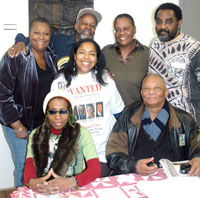Boston
Black history meeting connects today’s struggles
By
Bryan G. Pfeifer
Boston
Published Feb 23, 2006 12:01 AM
A broad range of working
class and oppressed people from across New England celebrated Black history
month in a public meeting sponsored by the Boston chapter of Workers World Party
on Feb. 18.
|
Boston forum. Seated: Mia Campbell and
Yves Alcindor. Wearing 'Wanted' T-shirt:
Clemencia Lee. Back row: Dorotea Manuela,
co-chair of Rosa Parks Day committee;
Robert Traynham, Monica Moorehead and
Tony Van Der Meer.
WW photo: Liz Green
|
Robert Traynham of the Steelworkers local 8751 bus drivers
union, chaired and opened the meeting entitled, “Katrina, Imper ialist War
& the Struggle for Black Liberation,” by leading the audience with a
rendition of the African-American nation al anthem, “Lift Every Voice and
Sing.”
Traynham conveyed one of his many personal experiences of
growing up under Jim Crow segregation in the South where, as a teenager, he and
his Black friends and family members were bussed past three white high schools
to attend an all-Black high school. After the Ku Klux Klan bombed the school,
Traynham was forced to attend classes in ramshackle temporary structures for the
duration of his high school years.
Clemencia Lee, co-director of the
Cultural Café, an independent alternative cultural venue of art and
politics and site of the meeting, welcomed participants who packed a gallery
room adorned with African-Latin@ diaspora art.
Tony Van Der Meer, adjunct
professor of Africana studies at UMass, co-chair of the Boston Rosa Parks Human
Rights Day Committee and co-founder of the Cultural Café, framed his
remarks within the context of Hurricane Katrina, the demand for reparations and
the historical treatment of Black people in North America from slavery to the
present day.
Denouncing FEMA’s criminal actions of evicting 4,500
survivors from hotel rooms and other shelters nationwide in early February, Van
Der Meer called for participants to support nationwide actions on Feb. 28
protesting this and another planned cutoff date on March 1, when 10,000 others
could be tossed out on the street. Survivors are now dispersed in 48 states and
over 400 cities, he said.
Van Der Meer then conveyed some proposals from
his recent trip to Mississippi where independent social justice organizations
and progressive individuals met to forge responses to U.S. government atrocities
in the Gulf Coast states of Louisiana, Alabama and Mississippi after Katrina.
Demands include the need to organize for the right to return, a
guaranteed income, housing, education, healthcare and other social needs as well
as access to funds and land, with the basis being the respect of the
self-determination of Black and other nationally oppressed peoples in these
affected areas.
A “People’s Reconstruction Plan” is
currently under discussion, and an international tribunal to hold accountable
all those responsible for the wholesale crimes against the mostly Black people
in the Gulf Coast is planned for late August, close to the anniversary of the
racist Aug. 28, 1955 lynching of 14-year-old Emmett Till.
Monica
Moorehead, WWP secretariat member, managing editor of WW newspaper and an editor
of Marxism, Reparations & the Black Freedom Struggle pamphlet, gave
an historical overview of the semi-slavery conditions of Black people that led
to the founding of Black History Month and provided an analysis of U.S.
imperialism’s effects both within the U.S. and abroad. She hailed the
Bolivarian Revolution in Venezuela, the TWU strike in New York and other
advances by the working class and oppressed worldwide and tied the struggle for
Black liberation to the necessity to broaden internationalism.
Moorehead
raised the need to prioritize the struggle against racism and national
oppression, including supporting the most oppressed in leadership roles in the
social justice movements, independent from the Republican and Democratic
capitalist parties. Moorehead also explained that socialism is the only economic
system that can guarantee human needs and workers’ power as opposed to
capitalism’s endemic ills that include racism, war, greed, cutbacks and
other forms of inequality.
Long time Puerto Rican independentista Alberto
Barretto denounced the U.S. government’s assassination of freedom fighter
Filiberto Ojeda Rios last year and the recent FBI terrorist raids in his
homeland against primarily pro-independence forces, while hailing revolutionary
developments in Latin America and the Carib bean. Barretto received rousing
applause with his closing remarks “Long live Puerto Rico free and
socialist. Inde pendence without socialism is nothing.“
Yves
Alcindor, leader of the New England Human Rights Organization for Haiti who
recently returned from Haiti, described to the audience his participation in a
delegation of independent election observers that oversaw the Haitian
masses’ successful presidential election of Rene Preval.
Mia
Campbell of the Women’s Fight back Network and Politicin’ With the
Sisters, raised the role of women and youth in the revolutionary struggle, and
then read a few poems including one that paid tribute to former gang leader
Stanley Tookie Williams who was executed on Dec. 13 at San Quentin prison.
Articles copyright 1995-2012 Workers World.
Verbatim copying and distribution of this entire article is permitted in any medium without royalty provided this notice is preserved.
Workers World, 55 W. 17 St., NY, NY 10011
Email:
[email protected]
Subscribe
[email protected]
Support independent news
DONATE


